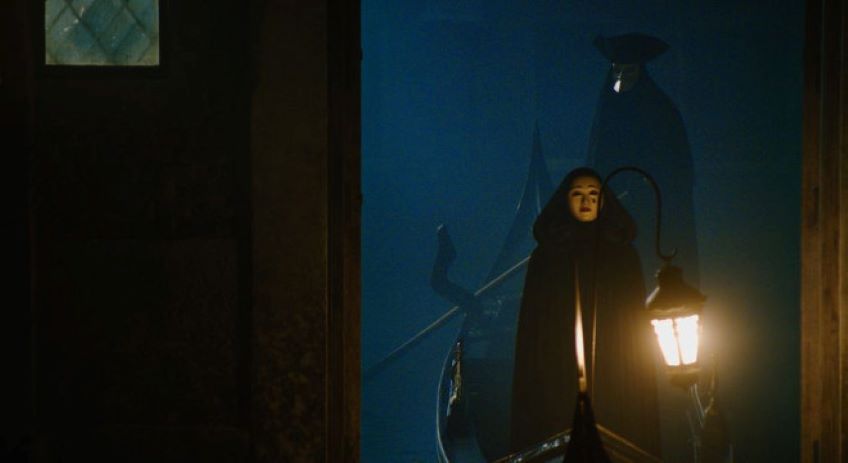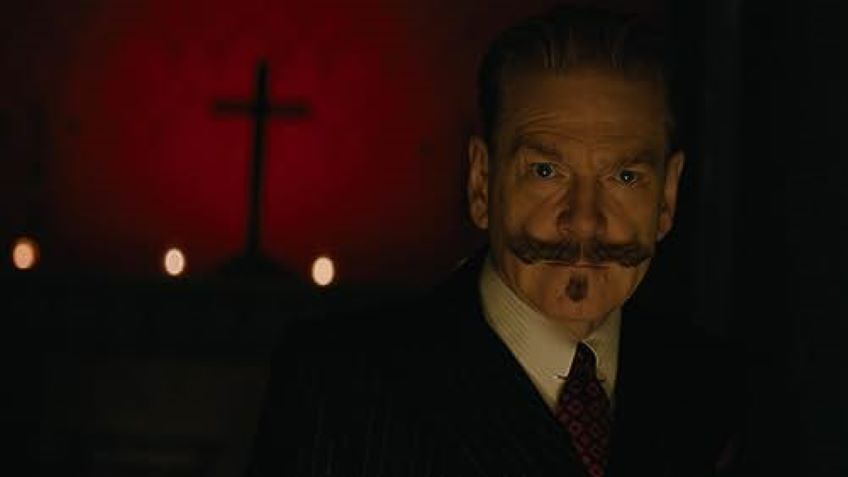Joyce Glasser reviews A Haunting in Venice (September 15, 2023) cert 12A, 103 mins. in cinemas.
Sitting through director Kenneth Branagh’s new Agatha Christie adaptation, A Haunting in Venice, in which he stars, you might question whether all the little grey cells were working behind the camera, while in front of the camera, Poirot figures out plots and motivations before we realise what they are. There is no harm in loosely adapting The Hallowe’en Party, a 1969 Poirot book, written seven years before Christie’s death at 85, but changing the location from the UK to Venice and diffusing and Gothicising the plot to the point of boredom, is another matter.
Was writer Michael Green wiped out? The busy Hollywood writer wrote or co-wrote four films released in 2017: James Mangold’s Logan, Ridley Scott’s Alien: Covenant, Denis Villeneuve’s Blade Runner 2049, and Kenneth Branagh’s Murder on the Orient Express. That star-studded jaunt was a huge box office hit and the two immediately began development on Death on the Nile, which was also a fairly profitable, star-studded exotic, and coherent mystery.
Perhaps the pair were restless and wanted to diverge from a faithful adaptation. But in 1947 when people were starving in war torn Italy, the Mafia stepping in to supply goods, the King being deposed, the Republic being established, and vigilante justice turning to the lingering Mussolini collaborators, you have to wonder why Poirot chose Venice for his retirement haven. It is also doubtful that anyone was celebrating Halloween, which, Italians of a certain age recall having arrived in Italy in the 1990s.

Halloween had, however, arrived in the UK when Christie wrote her 1969 novel, and a Halloween party in an English village was the setting of the murder of a thirteen-year-old girl who boasted she once witnessed a murder but was not believed. Shortly after, her body is found drowned in an apple-bobbing tub. Hercule Poirot is called in to find the evil presence, but is he looking for one or two?
Whether Halloween was creeping into the far more Venetian masked carnival, Mardi Gras, however, is nitpicking because the Halloween theme is quickly dissolved. Save for Poirot having a scare while incongruously bobbing for apples, the Halloween party of the underlying novel becomes an invitation to a séance.
The Halloween Party has nothing much to do with séances, but Christie’s short story, The Last Séance from 1933, which somehow legitimised this twist, was a product of its time. WB Yeats had just written his séance play, Words Upon the Window Pane (1930), and when the spiritualist Arthur Conan Doyle died that same year, the Royal Albert Hall was packed with fans hoping to see a medium who claimed to have communicated with the late creator of Sherlock Holmes.
So Green and Branagh introduce this battle between the Holmesian (and Poirotian) reason and logic and mysticism and spiritualism into their new film. Poirot, so traumatised by WWII, is questioning everything he believes in – even his sanity.
On Halloween, the American novelist Ariadne Oliver (Tina Fey, Date Night) approaches Poirot, now holed up in a Venetian penthouse with ex-police officer Vitale Portfoglio (Riccardo Scamarcio, John Wick: Chapter 3 – Parabellum, The Best of Youth) as his bodyguard. Oliver has written Poirot into her detective novels, making her wealthy, and Poirot more famous. She feels her books publicised his work, a bit like if Dr Watson felt Sherlock Holmes owed him something.
Now, in post-war times and with Poirot’s retirement, Oliver is going through a dry patch. She knows she can bait the great detective with an invitation to a séance at the palazzo of opera singer Rowena Drake (Kelly Reilly) by asking him to help her expose medium Joyce Reynolds (Michelle Yeoh, Everything Everywhere All at Once) as a fraud. The unmasking of Reynolds would sell thousands of copies – and even more if Poirot failed.

This entire set up is shot – digitally for the first time in Branagh’s Christie series – at strange angles, as though to disorient the viewer, and mainly at night, where the colours are lurid, and the gothic sets (in Pinewood Studios) exaggerated to induce claustrophobia. When Poirot arrives he is told the palazzo is haunted (as many Venetian palaces are!) with the souls of schoolgirls walled up there. This theme fades away like Halloween however, as there is a more recent murder to hand.
Rowena has hired Reynolds to help her commune with her daughter Alicia (Rowan Robinson), who, Rowena claims, committed suicide after her fiancé, chef Maxime Gerard (Kyle Allen, Space Oddity), broke off their engagement. The chef, however, who makes a surprise appearance, tells a different story.
Obfuscation being the name of the game, more characters are introduced, some red herrings, others key players. There’s Rowena’s loyal housekeeper Olga Seminoff (Camille Cottin from Call My Agent); the shell-shocked Drake family doctor Leslie Ferrier (Jamie Dornan, the father in Branagh’s film Belfast) and his precocious carer son Leopold (Jude Hill, the son and star of Branagh’s Belfast) and Reynolds’ assistant Desdemona Holland (Emma Laird) who has a brother (Ali Khan). Poirot is quick to unmask the assistants, realising Reynolds had help with her trickery in the séance, but there are other plots at play here which require more time to unravel.
Whether it is intentional (accents, whispering, throaty voices for effect etc), a fault with the digital sound recording or with the projection in the cinema, older viewers in particular will struggle to hear or understand many of the characters, including Cottin, Reilly, Laird, Dornan, and even Fey). Branagh is always articulate, even if his Poirot is no match for David Suchet’s.
Whether or not the clarity would help the overwhelming sense of “who cares”, is another matter. The other films had some humour and likeable characters, here, all is glum. It is not just the zombie characters and disparate directions we are pulled in that create this sense of boredom. It is that the filmmakers think this is a disturbing, frightening film with touches of gothic horror, and the audience is not the least bit moved, or scared.




